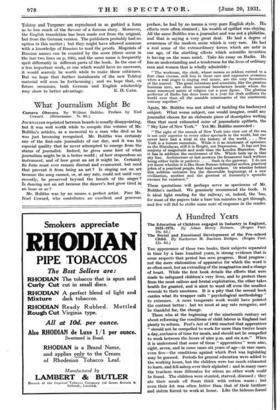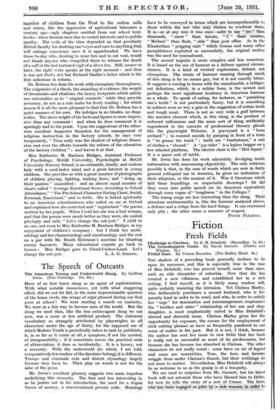A Hundred Years
THE appearance of these two books, their subjects separated in time by a bare hundred years, is strong evidence that in some respects that period has seen progress. Real progress ; not the mere elaboration of apparatus for which the word is so often used, but an extending of the imagination and a change of heart. While the first book details the efforts that were made to safeguard children's very lives, and to protect them from the most callous and brutal exploitation, the other takes
health for granted, and is alert to ward off even the smallest wounds to their emotions. It is a pity that the second book carries what its wrapper calls " psychological methodology " to extremes. A more temperate work would have pointed the contrast better : but we must at any rate recognize, and be thankful for, the change.
Those who at the beginning of the nineteenth century set about reforming the conditions of child labour in England had plenty to reform. Peel's Act of 1802 enacted that apprentices " should not be compelled to work for more than twelve hours a day, exclusive of time for meals, and should not be compelled to work between the hours of nine p.m. and six a.m." When it is understood that some of these " apprentices " were nine, eight, seven, and in some cases six years of age—in rare cases, even five—the conditions against which Peel was legislating may be guessed. Periods for general education were added to the working hours, but the children were too much exhausted to learn, and fell asleep over their alphabet : and in many cases the teachers were illiterates for whom no other work could be found. The children were stunted, starved, diseased ; they ate their meals off floors thick with cotton waste : but even, their Jot was often better than that of their brothers and sisters forced to work at home. Like the hideous forced marches of children from the West to the cotton mills and mines, like the oppression of agricultural labourers a century ago—ugly chapters omitted from our school text- books—these horrors were due to vested interests and to public apathy. The evils of the time depended on that peculiarly British faculty for shutting one's eyes and ears to anything that will outrage conscience once it is apprehended. We have those to-day who, desiring to wear furs and to eat veal, would not thank anyone who compelled them to witness the death of a calf or the last tortured vigil of a silver fox. Still, sooner or later, the right voice speaks at the right moment : and thus is was not Peel's Act but Richard Oastler's letter which is the first milestone in reform-.
Dr. Robson has done his work with exemplary thoroughness. The exigencies of a thesis, the amassing of evidence, the weight Of documents and citations, the heavy footprints which satisfy our universities as to " original research," while they provide accuracy, do not as a rule make for lively reading : for which season it is all the more pleasant to find that Dr. Robson has a quiet manner of his own. fie indulges in no tirades, no rhap- r. bodies. The sheer weight of his facts and figures is more impres-
sive than any comment : and when he does comment it is sparingly and to the point. Upon the suggestions of the other- viise excellent Inspector Saunders for the management of religious instruction in the factory schools, he says very temperately, " Thus early was the shadow of religious dissen- sion cast over the efforts towards the reform of the education of the factory children " : and leaves it at that.
Miss Katherine M. Bonham Bridges, Assistant Professor of Psychology, McGill UniversitY, Psychologist at McGill University Nursery School, is an estimable, kindly, and zealous lady with a card-index mind and a great interest in young children. She provides us with a great number of photographs of children playing, fighting, making faces, and " doing up their panties " unassisted : and an almost equal number of charts called " Average Emotional Scores According to School Attendance," "The Pre-School Character Rating Chart, Social, Personal, Emotional," and so forth.. She is linked spiritually to an American schoolmistress who called on me at Oxford and explained how she corrected and " regularized " the poems written by her pupils. When I told her she was a bad woman, and that the poems were much better as they were, she smiled pityingly and said, " Let's change the sub-ject." I yield to no one, not even to Miss Katherine M. Banharn Bridges, in my enjoyment of children's company : but I think her meth- odology and her characterology and emotionology and the rest on a par with Mr. Heath Robinson's machine for blunting enemy bayonets. Many educational experts go back to Greece : Miss Bridges goes to Cloud-Cuckoo-Land. Let's











































 Previous page
Previous page